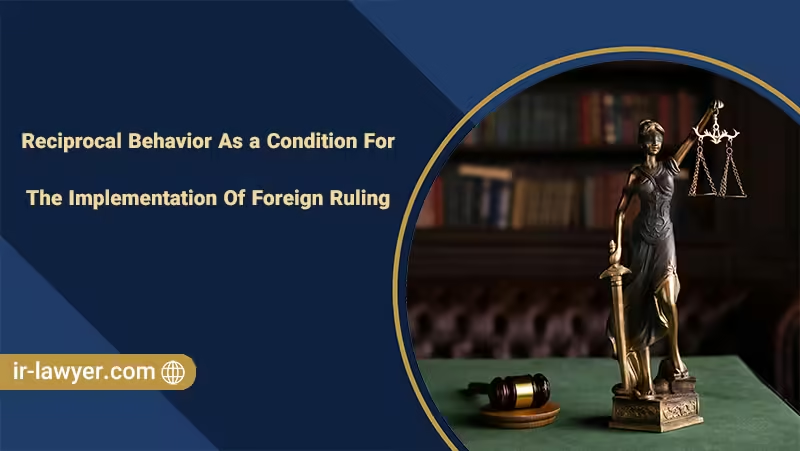dear user
I am Khalil Asayesh ( iranian lawyer from the Tehran Bar Association with license number 21129) Thank you for choosing my site to use legal services. We would like to inform you that this site has been set up with the aim of improving the level of legal information, legal advice and solving problems of domestic and international law.
My specialty is in the field of international companies and contracts, I have experience in advocacy in international arbitration, as well as experience in enforcing foreign judgments in Iranian courts and courts outside Iran (including Germany, France, Turkey, UAE.and Oman), so I am ready to provide you with legal services in this regard.
Telephone contact and whats app numbers:
09124439719 Iran
00971521583759 United Arab Emirates ( whats app)
“We are not responsible for holidays and non-working hours”
two sections before it, the Iranian court’s position on the issue of reciprocal behavior of the U.S. government will be predicted..
The reciprocal treatment of the foreign government has been conditioned on a number of conditions, including Rule 1295 of the Civil Code, Rule 169 of the Civil Law, Rule 293 of the Civil Procedure Code, The Law on the Accession of the Government of Iran to the Convention […] New York and Article 1 of the Law on The Competent Justice of the Islamic Republic of Iran to Deal with Civil Claims Against Foreign Governments Approved in 2011″) The Competency Act […]”). Apart from the opinion disputes regarding the insertion of this condition, its implementation in practice is accompanied by numerous complexity. In this article, we have chosen U.S. law for comparative study in this field, which is suitable for such studies in a number of respects: firstly, it is one of the few legal systems in the West in which the condition of reciprocal behavior is outright (though not with Consensus) is accepted and applied, secondly, because of the characteristics of the American legal structure, rich dreams have been formed in this country on this condition, thirdly political tensions and, consequently, the rights between Iran and that government of importance to achieve one. It has increased the exact action model for implementing this condition in exchange for its rulings 1. In this article, we will specificly examine the role of reciprocal conditions in identifying foreign courts.
Global definition and wide acceptance of the condition of definition.
1.1 Reciprocal behavior is the traditional principle of political philosophy, and since The Virtue and Aristotle, the foundation of concept and in the science of international relations, the foundation of international ethics has been established on two exchange justices to 3; Since on the one hand, identification is necessary (but the picture is not true) and on the other hand, the separation between the two concepts of identification and implementation in this article is not applicable, wherever the identification of rulings is mentioned, it should be identified and implemented in a sense, including identification and implementation..
1.2. The principle, advantage or fines imposed by one State against another or its nationals on the basis of this principle in relations between States 1,shall be met with equal treatment by the recentGovernment. It is these same motivations that make parables the main factor of the control over inter-individual relationships in the absence of centrality, i.e., the motivation of self-protection and equality. 2. Political, but contrary to the domestic rights of three private persons in which the prescribing of this principle is contrary to the central role of the state in ensuring order and justice and is accepted only as an exception, in the international public law, states, as the main guardians of their four rights, are, in effect, free under this principle. In private international law, as branches of private law, reciprocal behavior has a special situation; The inclusion of the principle of reciprocal behavior is based on the fact that the rulings issued by the court of each state are the act of the state’s ruling, and its recognition by the Government is another five benefits given to the state exporter. It should be added that reciprocal behavior has a negative side and a positive side. Positive reciprocal behavior, on the contrary, mandates the granting of a right or privilege 7 in the event of reciprocal behavior.
How can it be justified to include reciprocal behavior in the legal provisions of identifying foreign rulings?
The answers to this question are based on the priority of the legal and national doctors, which are given to one of the two internal/private or public/international wards of the courts. The court’s ruling on civil and commercial matters, on the other hand, like their other rulings, is an act of sovereignty, and in this regard, the issue of public or international law is placed, and on the other hand, through proof or negative of the right for one. One of the methods (the right to fight) and the establishment of another right (the right to apply for the execution of the sentence) is a new legal status in private law that should be recognized as a right to be respected in one world. However, even if we recognize the authority of governments to identify foreign rulings, it is difficult to deny that discrimination of the state as the enforcer of this authority, between foreign private persons or even among its citizens, on the basis of the behavior of a foreign state from which those persons have an independent personality and may not even be a citizen, means sacrificing the inalienable interests of a right to the interests of the suspected interests.In other case, its position inthe face of governments, as we will point out, has been criticized2 times, weakened. Until about 50 years ago, the practice of governments in terms of the provision of reciprocal behavior showed a significant difference, which was partly influenced by the gravity of one of the above two theory. The countries of Kamenla, like England, followed the theory of the right of the school and the principle in them was to identify the foreign ruling.There was no reciprocity in theirnumbers. European governments generally had a more closed approach to identifying foreign rulings. In the laws of countries subordinate to the Roman-Germanic system, generally more acceptable 6, however, in the laws of many of these countries, such as France 5, compared to the countries of Camenella, and naturally countries that rejectedthe identification of foreign court rulings already had no place in reciprocalbehavior. Developments in recent decades, such as the further expansion of trade relations and regional e-e-ism, have convinced countries to amend the criteria for identifying foreign rulings. Depending on each country’s initial position, these amendments have been most facilitated.




